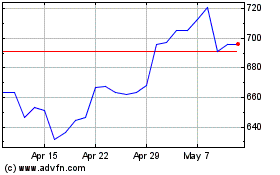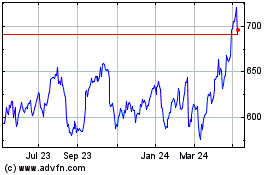HSBC Holdings 1Q Net Profit US$4.30 Billion
May 03 2016 - 1:17AM
Dow Jones News
By Julie Steinberg and Anjie Zheng
HONG KONG--HSBC Holdings PLC said market volatility in the
beginning of 2016 dragged on its ability to generate revenue as it
reported a 18.2% decline in net profit in the first quarter of this
year.
The British bank has been grappling with a falling share price
and concerns from investors over its strategy in Asia. HSBC's share
price is down about 32% from a year ago. Shares in Hong Kong
outpaced the Hang Seng Index's 1.1% drop Tuesday and fell 1.4% to
HK$51.10.
Chief Executive Stuart Gulliver acknowledged last month that the
share price "isn't where we want it to be," and said that keeping
costs down and revenue up are big challenges for the bank this year
because of weak economic conditions.
The bank said Tuesday that first-quarter net profit fell to
US$4.3 billion from US$5.26 billion a year ago. Revenues fell 5.8%
in the first quarter to US$14.98 billion.
Once a sprawling bank across 87 countries, HSBC has exited
swaths of businesses across the globe to improve profits and cope
with tougher regulations since the financial crisis. Its main
regions now are Asia, the U.K. and North America. In February, HSBC
decided to stay headquartered in London after considering a return
to its original Hong Kong base.
HSBC said Tuesday it increased market share in many strategic
areas including in debt capital markets, China M&A and
syndicated lending in Asia. Current and savings account revenues
grew in both Hong Kong and the UK, HSBC added.
The bank has been hit this year by soured sentiment toward
commodities and emerging markets, two key planks of its business.
Moody's Investors Service in March revised to negative from stable
its ratings outlook on HSBC, spurred by the ratings firm's concern
that "Hong Kong's increasing economic and financial linkages with
China...give rise to potential negative spillovers" from that
country "and ultimately weaker growth."
HSBC executives have said Asia will continue to drive future
growth for the bank, a strategy that may pay off in the future but
is seen as a short-term drag on earnings.
Some investors and analysts have raised concerns about HSBC's
strategy in the Pearl River Delta region, including uncertainty
over foreign banks' ability to compete for lending and deposits
against big state-owned banks. HSBC's ambitions could also be
tempered by China's slowdown and a weaker operating environment in
Asia Pacific.
Write to Anjie Zheng at anjie.zheng@wsj.com
(END) Dow Jones Newswires
May 03, 2016 01:02 ET (05:02 GMT)
Copyright (c) 2016 Dow Jones & Company, Inc.
Hsbc (LSE:HSBA)
Historical Stock Chart
From Apr 2024 to May 2024

Hsbc (LSE:HSBA)
Historical Stock Chart
From May 2023 to May 2024
